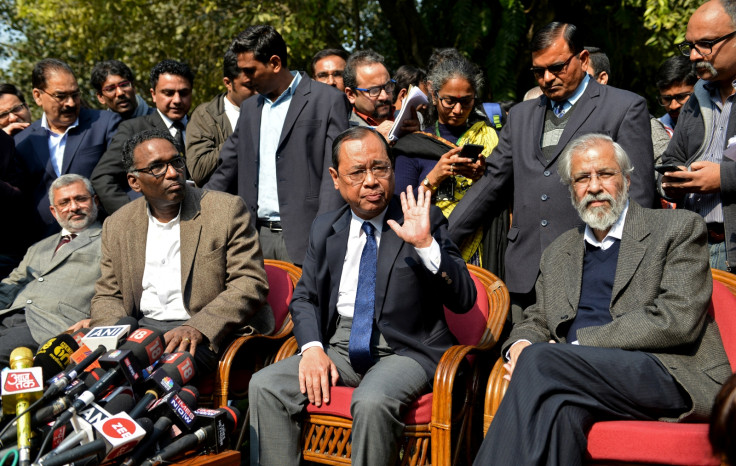Democracy in danger: India's highest judicial body witnessing an unparalleled fiasco
Four sitting judges of the Supreme Court in an unprecedented display of dissent against the Chief Justice of India.

The Supreme Court, India's highest judicial body and one of the most-revered institutions in the country, descended into a spectacular fiasco on Friday, 12 January. Four of its senior-most judges took on the Chief Justice of India in a public platform over the handling of court procedures – a display of dissent unheard of in the Indian judiciary.
Sitting judges of India's top court, a decorated and powerful establishment, hardly ever interact with media, abiding by an unwritten custom to protect the integrity of their judgments. But, there came a blow when four judges – Jasti Chelameswar, Ranjan Gogoi, Madan Bhimrao Lokur and Kurian Joseph – called for a press conference to air their criticism against their fellow judge, who happens to be the chief justice.
Leading the attack was Chelameswar, the second-most senior judge of the bench, who went on to say the absence of impartiality in judicial matters is serious enough to imperil Indian democracy. He just stopped short of saying impeachment proceedings against Chief Justice Dipak Misra should be set in motion but left it to the nation to decide.
Those four judges took offence to the way the chief justice has been assigned cases and deciding benches.
Drubbing the technique that the chief justice employed the "master of the roster," the opposing judges said in a statement that the "convention of recognising the privilege of the Chief Justice to form the roster and assign cases to different benches of this court is a convention devised for the efficient functioning of the court but it is not a recognition of any superior authority, legal or factual, over his colleagues".
Nonetheless, the judges were careful enough not to reveal specifics of their concerns in order to guard the uprightness of the highest seat of the judiciary and its chief. But, they said they had attempted to convince the chief justice to take up an independent stand but their efforts did not succeed.
"Four of us are convinced, the democracy will not survive. We met CJI this morning, with [a] specific request but we could not convince him. We had no choice but to communicate to the nation to take care of the institution. We place it before people the of country," said Justice Gogoi.
Judiciary in India is considered sanctimonious and hardly every subjected to criticism from the outside world, whether the legislative or the executive wing of the parliamentary system. This gives the judicial system enormous leeway to manoeuvre internally whether in the case of appointment of judges to dictating the court proceedings. A powerful 'contempt of court' legislation only strengthens its muscle.
The dramatic event forced Prime Minister Narendra Modi to hold an emergency meeting with the country's law minister. Top judicial experts, ranging from practicing senior advocates to retired judges and attorney generals have expressed shock over the unfolding of events.
Opinions are sharply divided over whether the judges should have taken such extraordinary step. While many have said this would lead to opening a can of worms in its path to bringing transparency into the judicial system, others have said such an episode would only dent an irreparable damaged to judiciary.
"There's no question of selling their souls. I don't think it's a good move and I'm not in favour of it at all. I'm very upset about this, I wish the four Supreme Court judges hadn't done this. This will have severe repercussions on judiciary," said Soli Sorabjee, India's former attorney general and considered one of the finest judicial minds in the country.
Indirani Jaising, a senior advocate at the Supreme Court, said: "I think it's a historic Press Conference. It was very well done. I think we, the people of India, have a right to know what is going on within the judiciary & I welcome this."






















